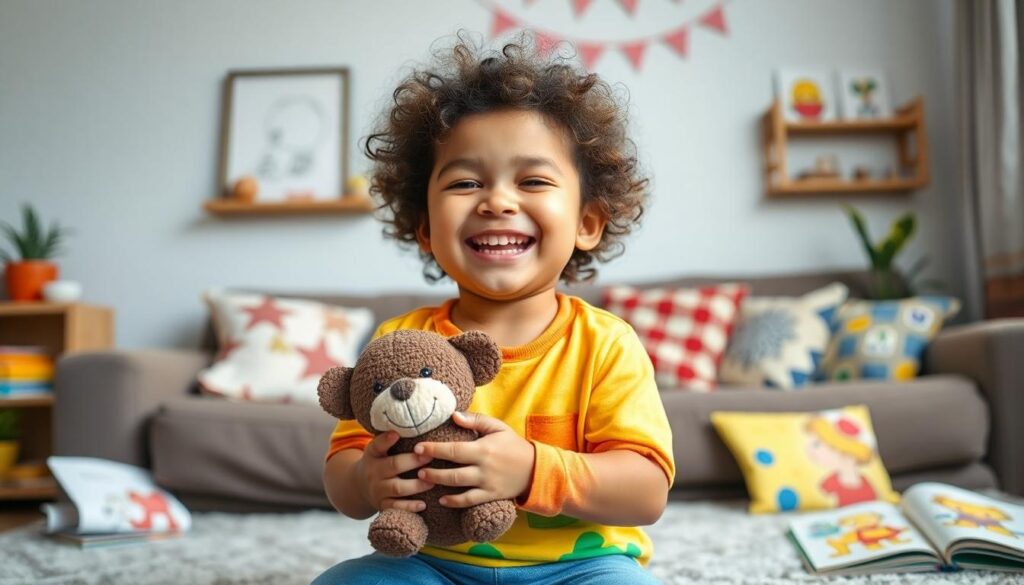Looking for ways to bring more giggles into your toddler’s day? We’ve compiled the ultimate collection of toddler jokes that will have your little one laughing uncontrollably! There’s nothing quite like the sound of a toddler’s belly laugh to brighten up even the cloudiest day.
These age-appropriate jokes aren’t just fun—they’re also great for your child’s development. When we share humor with toddlers, we’re helping them develop language skills, cognitive abilities, and social connections. Plus, laughter creates precious bonding moments between parents and children that you’ll both treasure for years to come.
10 Silly Animal Jokes That Will Make Your Toddler Giggle
- Why don’t elephants use computers? They’re afraid of the mouse! Your toddler will love this play on words about the giant animal being scared of something tiny.
- What do you call a sleeping bull? A bulldozer! This joke combines animals with familiar construction equipment, creating a funny mental image for little ones.
- Why did the chicken cross the playground? To get to the other slide! We’ve updated the classic chicken joke with a playground twist that toddlers can relate to.
- What do you call a fish wearing a crown? King of the sea! This royal fish joke will have your toddler giggling while learning about monarchy concepts.
- How do you make a tissue dance? Put a little boogie in it! Kids find nose humor particularly hilarious, and this joke delivers with its simple punchline.
- What does a cat wear to bed? Paw-jamas! Toddlers who love their own pajamas will appreciate this cute play on words about their feline friends.
- Why are frogs so happy? They eat whatever bugs them! This joke works on multiple levels and introduces the concept of wordplay to your little one.
- What do you call a bear with no teeth? A gummy bear! Children who enjoy gummy bear treats will make the connection and laugh at this toothless predator.
- How do you count cows? With a cow-culator! Math meets barnyard animals in this silly joke that combines familiar concepts for toddlers.
- What do you call a duck that gets all A’s? A wise quacker! This school-themed animal joke rewards good academic performance with a funny punchline.
8 Knock-Knock Jokes Perfect for Toddler Humor

- Boo
Knock, knock. Who’s there? Boo. Boo who? Don’t cry, it’s just a joke!
- Cow Says
Knock, knock. Who’s there? Cow says. Cow says who? No, cow says mooooo!
- Lettuce
Knock, knock. Who’s there? Lettuce. Lettuce who? Lettuce in, it’s cold out here!
- Atch
Knock, knock. Who’s there? Atch. Atch who? Bless you!
- Canoe
Knock, knock. Who’s there? Canoe. Canoe who? Canoe come out and play with me?
- Annie
Knock, knock. Who’s there? Annie. Annie who? Annie body home? Let’s play!
- Water
Knock, knock. Who’s there? Water. Water who? Water you waiting for, let’s get playing!
- Justin
Knock, knock. Who’s there? Justin. Justin who? Justin time for dinner!
Easy-to-Remember Knock-Knock Jokes
These knock-knock jokes are specifically designed with toddlers’ developing language skills in mind. Their simple structure makes them perfect for young children who are just discovering the joy of wordplay. Toddlers love sound-based jokes like “Atch” (which mimics a sneeze) or “Cow says” which plays on animal sounds they’re already familiar with. The predictable format of knock-knock jokes helps children anticipate what comes next, building their confidence as they master each joke. Many toddlers will giggle uncontrollably at these simple punchlines and quickly learn to repeat them to others.
Interactive Knock-Knock Jokes for Parent-Child Bonding
Knock-knock jokes create perfect opportunities for meaningful interaction between parents and toddlers. The call-and-response nature of these jokes encourages turn-taking, an essential social skill for young children. Parents can enhance the experience by using exaggerated expressions when delivering punchlines like “Don’t cry, it’s just a joke!” or “Lettuce in, it’s cold out here!” These shared moments of laughter strengthen parent-child bonds while simultaneously supporting language development. Toddlers delight in participating in these simple jokes, and the structured format helps them learn conversation patterns that they’ll use throughout life. Regularly incorporating these jokes into playtime creates traditions of humor that can become cherished family memories.
12 Food-Themed Toddler Jokes That Make Snack Time Fun
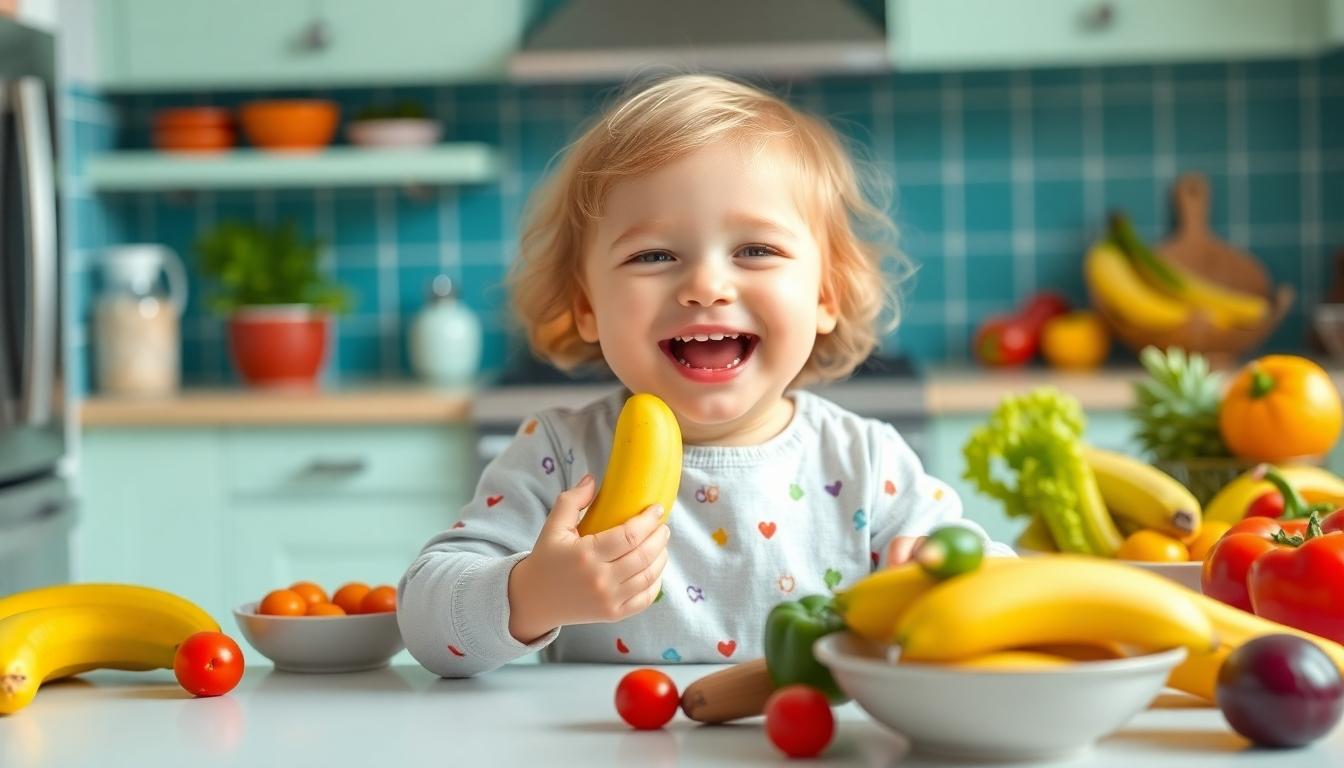
Transform mealtime into laugh time with these food-themed jokes that toddlers love. These simple, silly punchlines can turn even the pickiest eater’s frown upside down during snack time.
Fruit and Vegetable Jokes
- What fruit do twins love? Pears!
- What is a scarecrow’s favorite fruit? A strawberry.
- Why did the banana go to the doctor? Because it wasn’t peeling well!
- What vegetable can’t you take on a boat? Leeks!
- Why did the tomato blush? Because it saw the salad dressing!
- What do you call a stolen yam? A hot potato!
Dessert and Treat Jokes
- What kind of keys are sweet? Cookies!
- What do you call two bananas? Slippers.
- Why did the cookie go to the hospital? Because it felt crummy!
- What did the ice cream say when it got melted? I’m in a sticky situation!
- How do you make a milkshake? Tell it a scary story!
7 Weather and Nature Jokes for Curious Toddlers
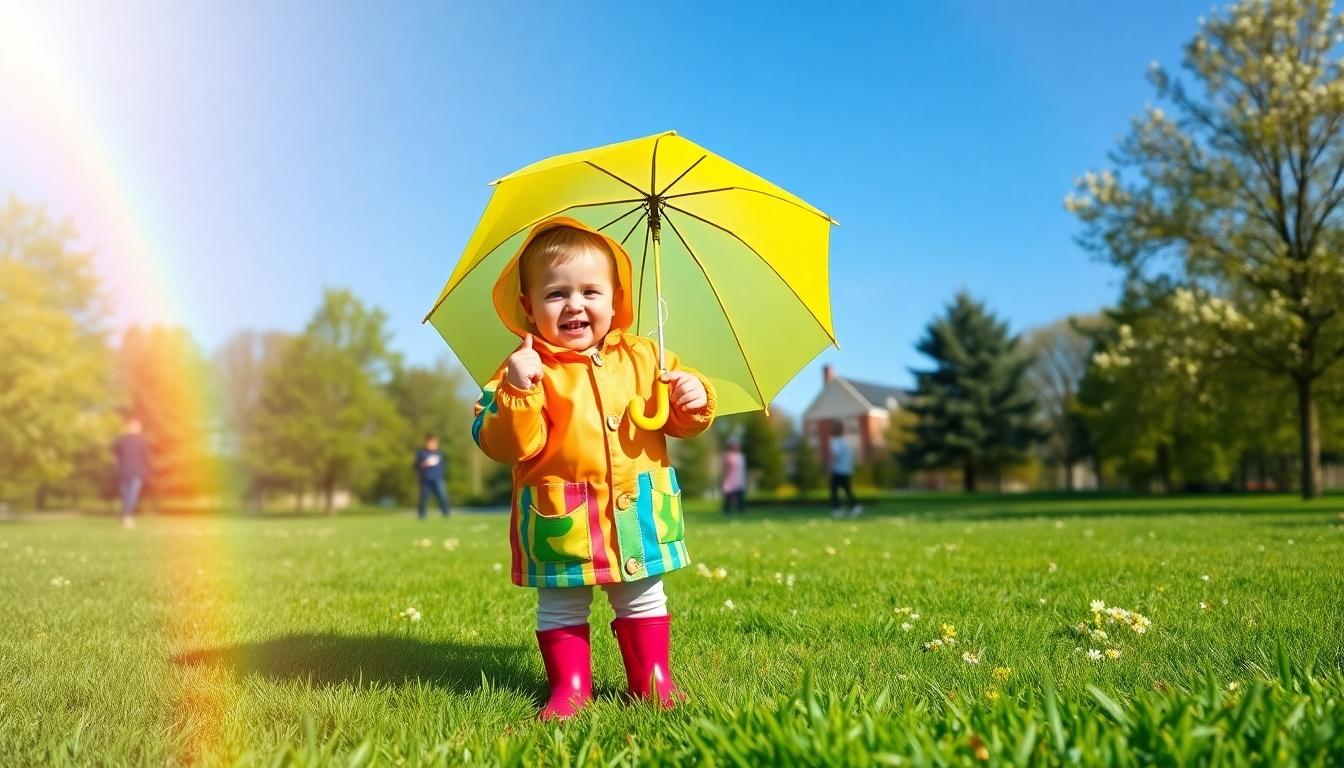
Weather and nature provide the perfect backdrop for introducing scientific concepts to toddlers through humor. We’ve gathered seven simple yet delightful jokes that will have your little ones giggling while learning about the industry around them:
- Rainbow Joke:
Q: What kind of bow can’t be tied?
A: A rainbow!
- Sun’s Education:
Q: Why did the sun go to school?
A: To get a little brighter!
- Umbrella Fun:
Q: What goes up when the rain comes down?
A: Umbrellas!
- Fowl Weather:
Q: Why do chickens play in the rain?
A: They love fowl weather!
- Snowman Joke:
Q: What do you call a snowman on a hot day?
A: A puddle!
- Drizzly Bear:
Q: What kind of bear gets caught in a rain storm?
A: A drizzly bear!
- Temperature Trick:
Q: What drops but never hits the ground?
A: The temperature!
These colorful jokes introduce toddlers to weather phenomena and natural elements in a playful way. Your curious little ones will enjoy these simple wordplays while absorbing basic concepts about rainbows, sunshine, rain, and temperature changes. Try acting out these jokes with hand motions or simple props to make them even more captivating for your toddler’s developing mind.
9 Bathroom Humor Jokes That Toddlers Find Hilarious
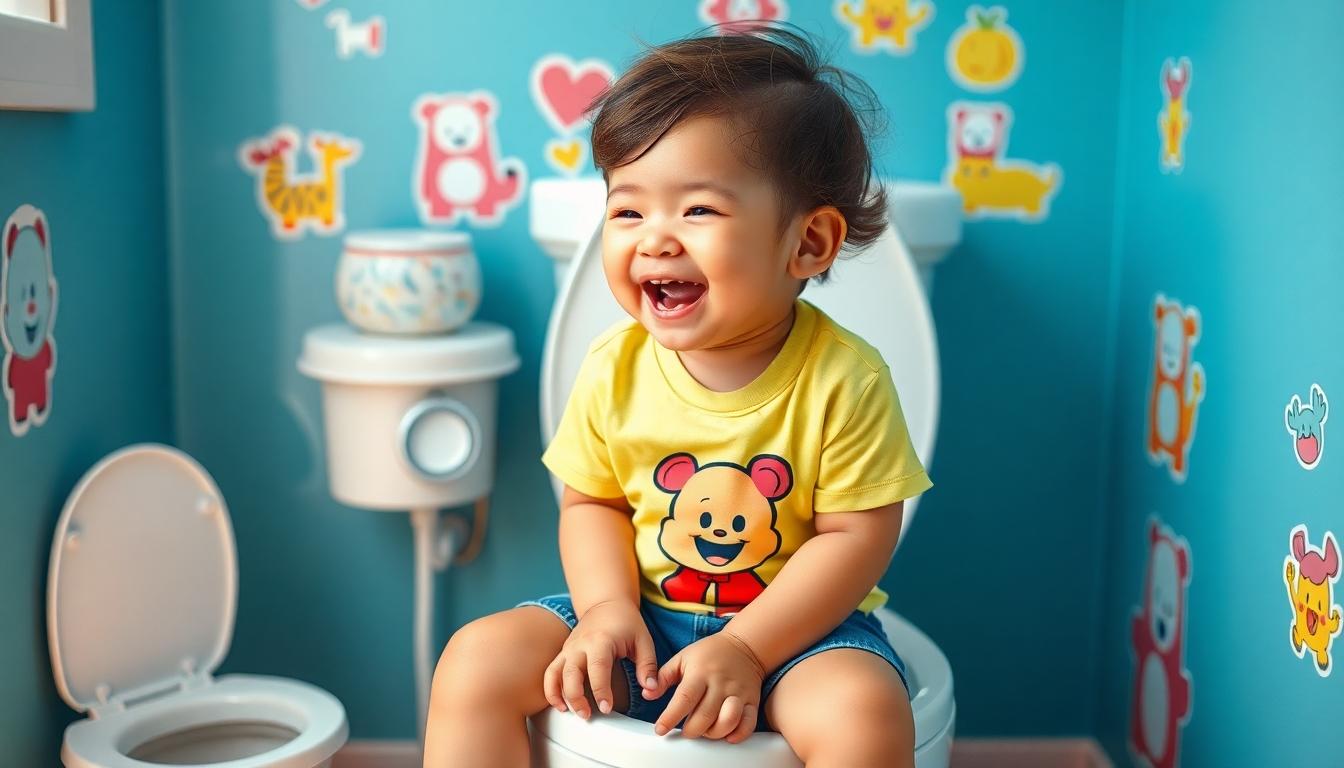
Let’s face it – toddlers find bathroom humor absolutely hysterical! Their natural curiosity about bodily functions makes potty jokes an instant hit. We’ve collected nine bathroom jokes guaranteed to get those belly laughs flowing from your little one.
- What do you call a dog in your toilet?
A poodle! This simple play on words combines two things toddlers love – animals and potty talk – for a joke that’s sure to get giggles.
- What did the poo say when it was flushed down the loo?
Toddlers love making the “Bye!” or “Whoosh!” sound effects with this one, adding their own creative punchline while learning about cause and effect.
- Why was Tigger in the bathroom?
He was looking for Pooh! This clever joke referencing the beloved Winnie the Pooh characters works on multiple levels for toddlers.
- What did one toilet say to the other?
You look a little flushed! Personifying bathroom objects creates an amusing scenario that toddlers find entertaining as they learn about everyday objects.
- Why does Spider-Man always flush the toilet?
Because it’s his doody! This superhero twist on bathroom humor combines a favorite character with a play on “duty” that toddlers find hilarious.
- Why couldn’t the police officers find the toilet thief?
Because they had nothing to go on! This joke introduces wordplay that even younger toddlers can appreciate through your animated delivery.
- What do octopuses do after using the toilet?
They wash their hands, hands, hands! This joke reinforces good hygiene habits while making toddlers laugh at the idea of an octopus with multiple hands.
- If you’re an American in the sitting room, what are you in the bathroom?
Euro-pee-an! While toddlers might not understand the wordplay fully, they’ll laugh at your silly pronunciation and the bathroom reference.
- What should you do if you find a grizzly bear in your toilet?
Be polite and wait until he’s finished, of course! The absurd image of a bear using a toilet creates a funny mental picture that toddlers find amusing.
These bathroom jokes provide a playful way for toddlers to explore topics they’re naturally curious about. Using humor around potty training can also help ease anxieties and make the process more enjoyable for everyone involved.
6 Simple Wordplay Jokes That Build Language Skills
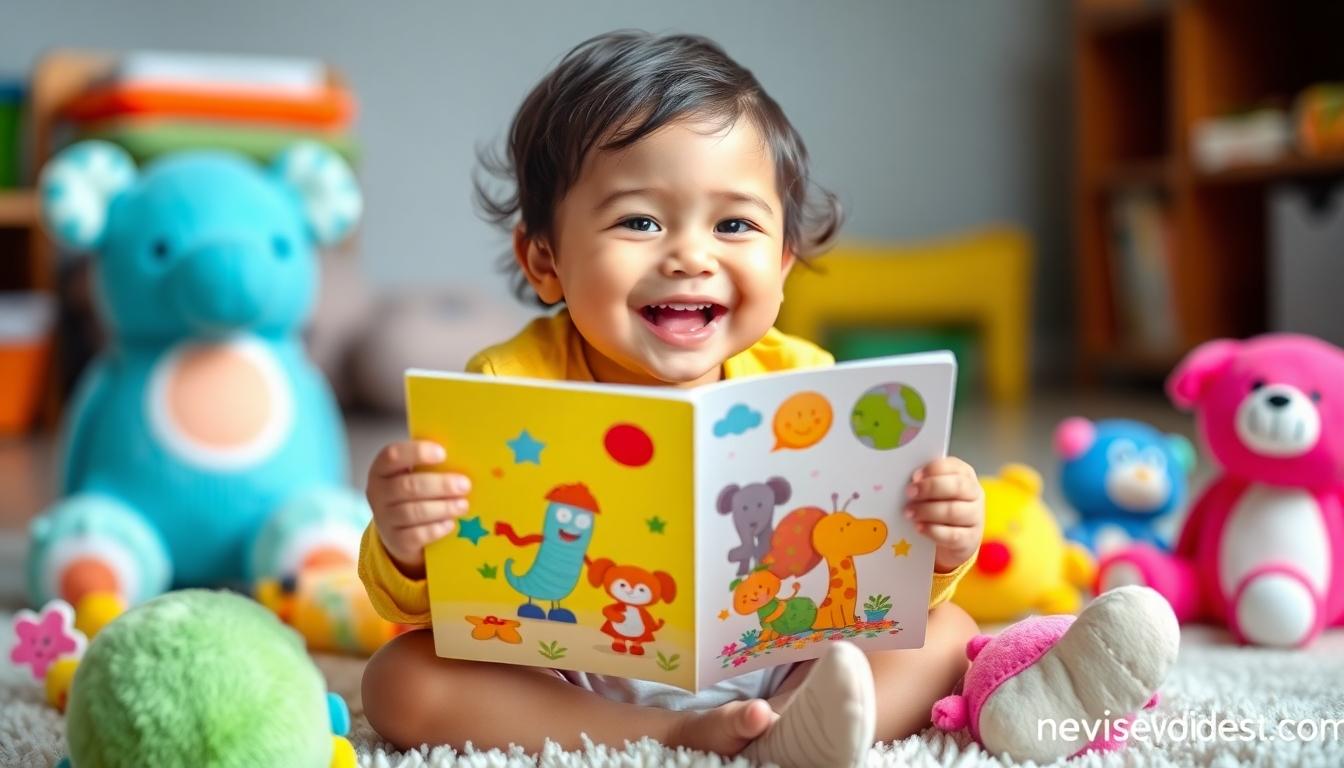
Wordplay jokes help toddlers develop crucial language skills while creating moments of joy and laughter. These playful interactions support phonological awareness, vocabulary expansion, and creative thinking.
Rhyming Jokes for Toddlers
Rhyming jokes create excellent opportunities for toddlers to recognize sound patterns and develop phonological awareness. When you change a familiar word in a rhyme or nursery rhyme, toddlers become delighted by the unexpected twist. Try asking, “What do you call a cat wearing a hat? A flat cat!” or “What did the dog say to the frog? Nice to meet you, I’m going for a jog!” These simple rhyming jokes encourage toddlers to identify similar-sounding word endings, which builds essential pre-reading skills. Incorporating rhymes into daily routines helps toddlers recognize language patterns that will benefit their literacy development as they grow.
Pun-Based Jokes for Developing Minds
Simple puns introduce toddlers to the playful side of language while supporting their cognitive development. Although toddlers might not fully grasp the double meanings in puns until they reach preschool age, early exposure builds the foundation for understanding wordplay. We recommend starting with basic sound substitutions like, “What do cats like to eat? Mice cream!” or pointing to your ear when asked about your nose, creating a humorous moment through deliberate mislabeling. Playing with words like “cat” and “hat” helps toddlers recognize how changing just one sound creates entirely new meanings. These language games promote vocabulary growth and prepare young minds for more complex language concepts they’ll encounter in their educational journey.
8 Movement and Action Jokes to Get Toddlers Laughing
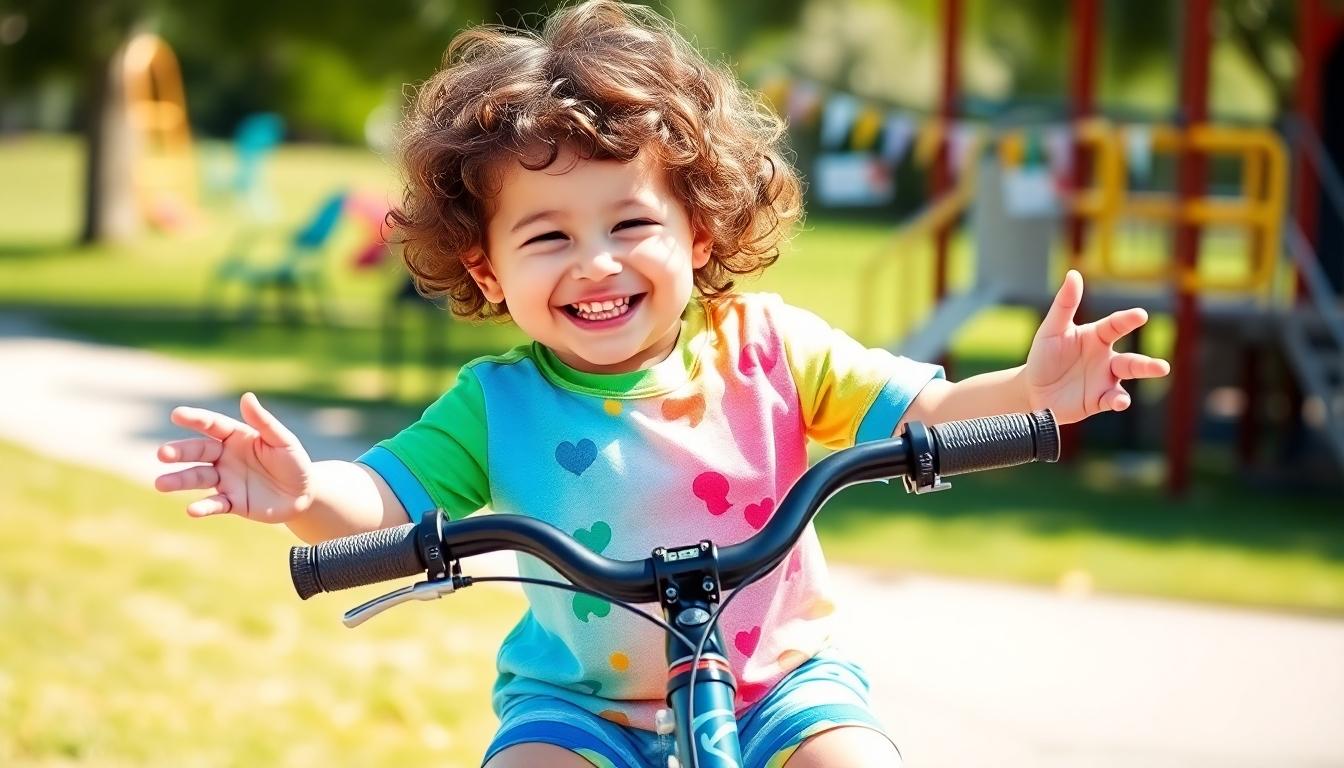
Looking for jokes that get your toddler moving and giggling? Movement-based humor is particularly effective for young children because it combines physical comedy with simple wordplay. These action-oriented jokes encourage your little one to engage their whole body while developing their sense of humor. Here are eight hilarious jokes that will have your toddler laughing while promoting physical expression:
- Why did the bicycle fall over? Because it was two-tired! This classic joke invites toddlers to act out the motion of a bicycle tipping over, encouraging balance and falling pretend play.
- Why did the kid bring a ladder to school? Because he wanted to go to high school! Watch as your toddler stretches tall or makes climbing gestures while giggling at this height-themed joke.
- What do you call a sleeping bull? A bulldozer! Toddlers love this one because they can practice animal sounds and exaggerated snoring actions when delivering the punchline.
- Why don’t skeletons ever go trick or treating? Because they have no body to go with! This spooky joke stimulates dancing or bone-rattling movements that toddlers find absolutely hilarious.
- Why did the golfer bring an extra ball? In case he got a hole in one! Children enjoy mimicking swinging motions or jumping with surprise when they get to the “hole-in-one” punchline.
- What do you get when you cross a snowman and a vampire? Frostbite! This seasonal joke encourages shivering motions and cold-weather pretend play that toddlers can act out.
- Why did the belt get arrested? For holding up a pair of pants! Toddlers can tug at their waistbands or play a mock “police chase” game while telling this clothing-themed joke.
- What do you call an alligator in a vest? An investigator! This detective-inspired joke suggests fun actions like using a pretend magnifying glass or tip-toeing around on an investigation.
These jokes tap into toddlers’ love of physical comedy and concrete concepts like animals, clothing, and everyday objects. Research shows that movement enhances laughter and engagement in early childhood, making these action-based jokes particularly effective. Try emphasizing the physical elements by demonstrating the movements yourself first, then encouraging your toddler to join in with their own interpretations.
11 “Why Did” Questions That Toddlers Can Understand
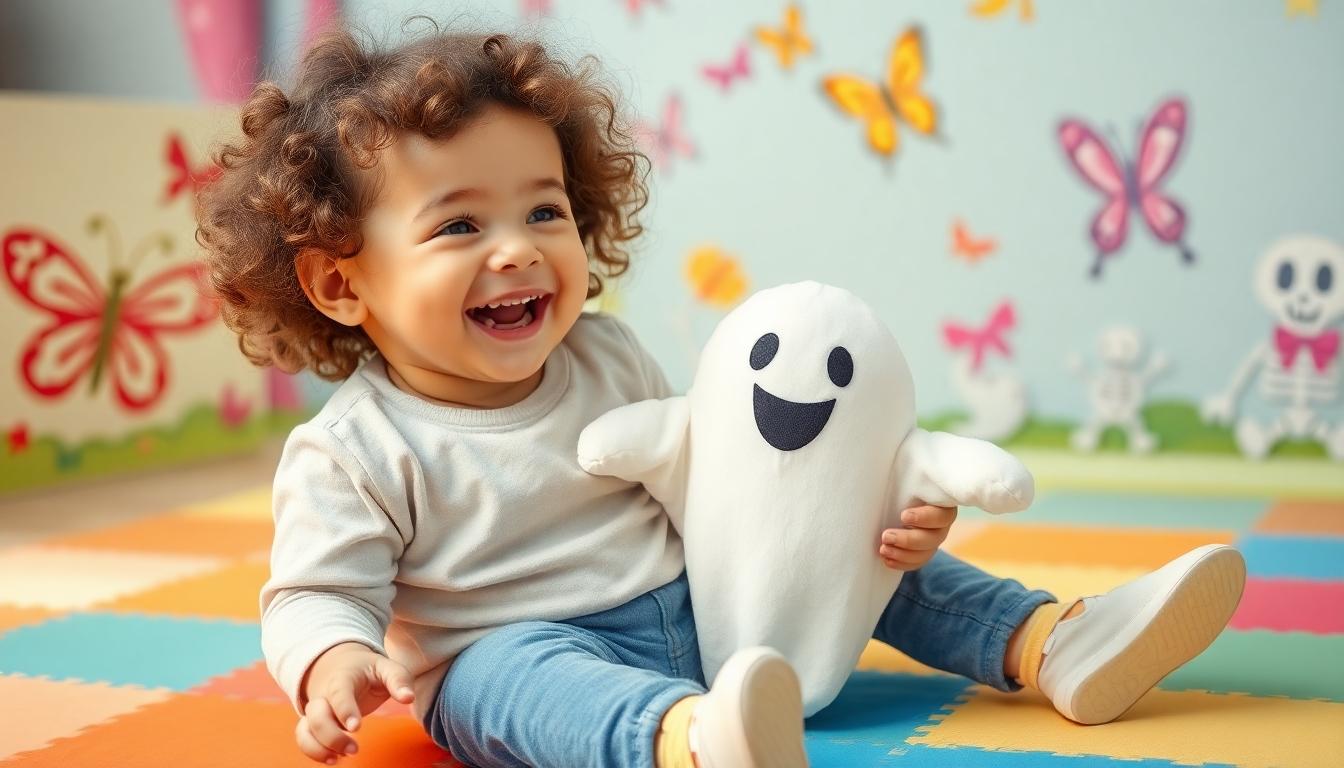
Toddlers adore “why did” jokes because they build anticipation and deliver unexpected punchlines that match their developing sense of humor. These question-and-answer format jokes are perfect for little ones who are beginning to grasp wordplay and simple puns. We’ve gathered 11 toddler-friendly “why did” jokes that will have your little ones giggling with delight.
- Why did the teacher throw a stick of butter out the window? To make a butterfly! This visual joke helps toddlers connect the words “butter” and “fly” in a silly and memorable way.
- Why did the teacher wear sunglasses? Because her students were so bright! Toddlers love jokes that give compliments while being funny at the same time.
- Why can’t Dalmatians win at hide and seek? They’re always spotted! This playful pun on the word “spotted” introduces toddlers to the concept of double meanings.
- Why do ghosts wear BOOts? For spooky footwear! The emphasis on “BOO” makes this joke particularly appealing to toddlers who are learning about scary-but-not-too-scary concepts.
- Why do skeletons play the tromBONE? The wordplay on “bone” within “trombone” makes this joke a hit with toddlers who are discovering parts of the body.
- Why did the oven say it’s hot? To joke about temperature! Toddlers find humor in objects talking and expressing feelings, making this anthropomorphic joke especially entertaining.
- Why did zero compliment eight? For its “belt” (the shape of the number)! This joke introduces number recognition in a playful way that toddlers can visualize.
- Why did the broom arrive late? It over-swept! Toddlers appreciate this simple pun that creates an unexpected connection between sweeping and oversleeping.
- Why would a nose not be 12 inches? It’d be a foot! This joke introduces measurement concepts while playing with body part terms in a way toddlers find hilarious.
- Why do zombies eat brain food? This literal interpretation pun tickles toddlers’ funny bones as they learn about figurative versus literal meanings in language.
- Why did one math book complain? It had too many problems! Even toddlers who don’t understand math can appreciate the wordplay between math problems and everyday problems.
These “why did” jokes align perfectly with toddlers’ developmental stage, as they use simple vocabulary, visualizable imagery, and unexpected outcomes that match their emerging understanding of language rules and social norms. The structure of these jokes helps toddlers practice question-and-answer patterns, building their conversational skills while they laugh along with you.
5 Ways to Use Toddler Jokes for Developmental Benefits
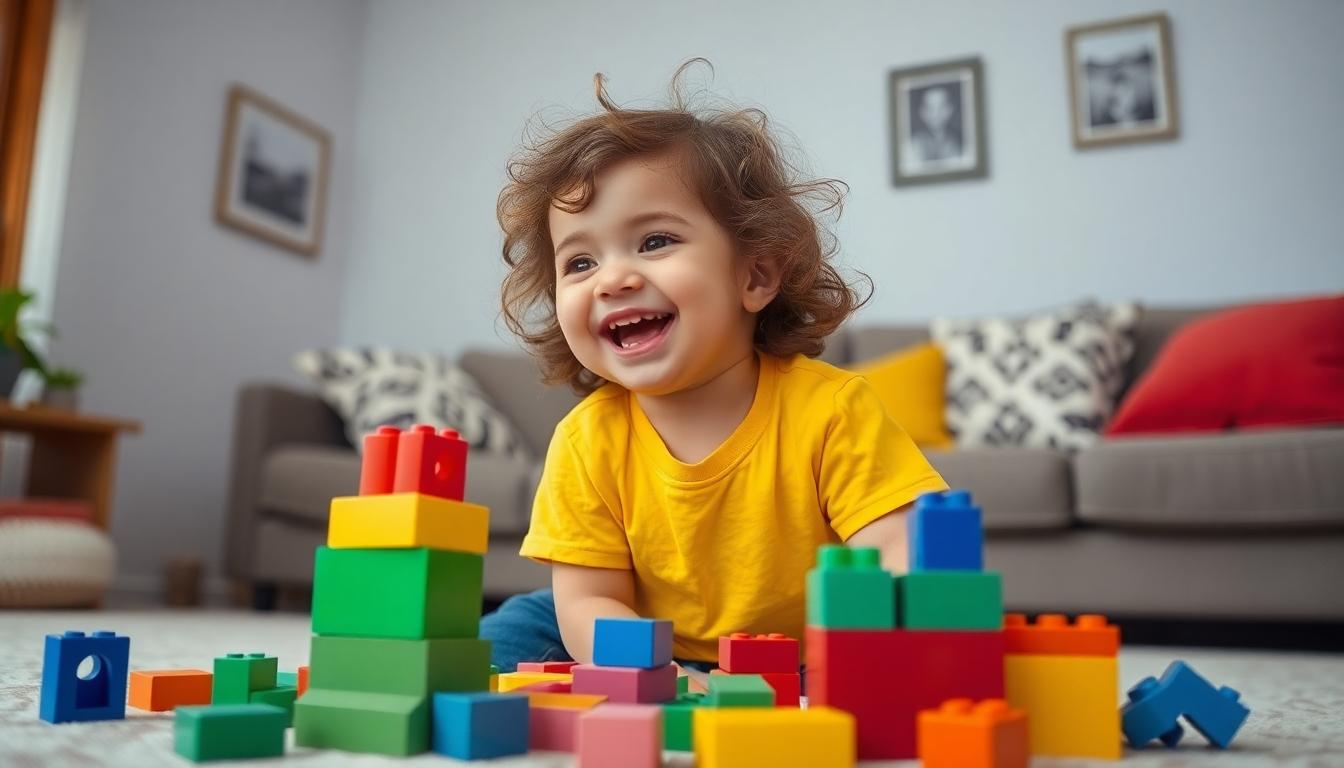
1. Improving Language Skills
Toddler jokes serve as powerful tools for language development when incorporated into daily routines. We recommend using humorous books, songs, and rhymes to expose little ones to new vocabulary in entertaining contexts. Children naturally engage with funny content, making joke time an ideal opportunity to introduce unfamiliar words and phrases. Ask your toddler to repeat the punchlines or participate in silly rhymes to strengthen their vocal skills and pronunciation. This playful approach to language learning creates a positive association with communication while building essential speaking abilities.
2. Cognitive Development
Jokes help toddlers develop critical thinking skills through their understanding of unexpected outcomes. Young children find humor in incongruity—situations that defy expectations like a cat wearing a hat or a horse saying “moo.” These funny scenarios help children practice cognitive flexibility as they navigate between what’s expected and what actually happens. We’ve found that toddlers who regularly engage with humor develop stronger problem-solving abilities and become more adaptable in their thinking patterns. Their brains learn to make connections between seemingly unrelated concepts, a foundational skill for creative thinking.
3. Social Relationship Building
Sharing jokes strengthens bonds between toddlers and their caregivers through shared enjoyment. Parents who incorporate humor into daily interactions create stronger emotional connections with their children. The laughter shared during joke time releases endorphins that reinforce positive feelings between parent and child. Toddlers who learn to appreciate and share humor also tend to be better liked by their peers, giving them advantages in social settings. These early experiences with humor help establish healthy social patterns that benefit children throughout their development.
4. Emotional Intelligence
Humor offers toddlers valuable tools for managing stress and processing emotions. Children who engage with jokes learn to view challenging situations from different perspectives, building emotional resilience. We can use funny scenarios to help toddlers recognize and name various emotional states in a low-pressure environment. Laughter itself provides a physical release of tension, teaching young children that they can shift their emotional state through humor. This emotional regulation skill becomes increasingly important as toddlers navigate the often frustrating challenges of early childhood.
5. Encouraging Creativity
Jokes spark imagination and creative thinking in developing minds. Toddlers who engage with humor often become more adventurous in their imaginative play, creating elaborate scenarios based on funny concepts they’ve encountered. We encourage parents to build on joke themes through role-playing activities where children can invent their own humorous situations. Simple activities like pretending to eat non-food items or making silly animal sounds stimulate creative neural pathways. This creative foundation supports future academic learning and problem-solving abilities while making everyday moments more enjoyable.
The Best Times to Share Jokes With Your Toddler
Laughter truly is the best medicine especially for our little ones. These toddler jokes aren’t just entertainment—they’re powerful tools for development wrapped in giggles and smiles.
Whether you’re making mealtime more fun with food jokes sharing knock-knock jokes during car rides or lightening the mood during potty training with bathroom humor you’re building valuable skills while creating joyful memories.
We encourage you to keep these jokes in your parenting toolkit and watch how they transform everyday moments into opportunities for connection and learning. After all there’s nothing quite like hearing your toddler’s infectious laughter and seeing their eyes light up with the pride of understanding a joke for the very first time.
Frequently Asked Questions
Why are jokes important for toddlers’ development?
Jokes support multiple developmental areas for toddlers. They enhance language skills by introducing new vocabulary in fun contexts, boost cognitive abilities through understanding unexpected outcomes, strengthen parent-child bonds, develop emotional intelligence, and encourage creativity. When toddlers laugh and share jokes, they’re not just having fun—they’re building essential life skills that contribute to healthy development.
At what age can toddlers start understanding jokes?
Most toddlers begin understanding simple humor around 15-18 months, but their appreciation for structured jokes typically develops between ages 2-3. By age 3, most toddlers can grasp basic wordplay and silly scenarios. Remember that every child develops at their own pace, so follow your child’s lead and start with simple, visual jokes that match their comprehension level.
What types of jokes work best for toddlers?
The best jokes for toddlers are simple, concrete, and visual. Animal jokes, knock-knock jokes, and silly sounds tend to work well. Physical humor (like pretending to slip) and unexpected outcomes also get big laughs. Avoid abstract concepts, sarcasm, or jokes with complex language. Keep punchlines straightforward and use animated facial expressions when delivering the joke.
How can I use jokes to help with potty training?
Bathroom humor naturally appeals to toddlers learning about bodily functions. Use gentle potty jokes to reduce anxiety around toilet training and make the process more enjoyable. Jokes like “What do you call a dog in your toilet? A poodle!” can transform a potentially stressful situation into a fun experience. Laughter creates positive associations with potty time, potentially easing resistance to training.
Can jokes help with picky eating?
Yes! Food-themed jokes can make mealtimes more enjoyable for reluctant eaters. Jokes about fruits, vegetables, and other foods create positive associations with eating. Try serving a banana with a joke about why it went to the doctor (“Because it wasn’t peeling well!”). The playful atmosphere can reduce mealtime tension and potentially increase willingness to try new foods.
How do knock-knock jokes benefit toddlers specifically?
Knock-knock jokes teach toddlers valuable conversational skills through their predictable format. They reinforce turn-taking, active listening, and anticipation—all crucial social skills. The repetitive structure helps toddlers master the joke format, building confidence as they learn to deliver punchlines. These jokes also create interactive moments between parents and children, strengthening your bond through shared laughter.
How can I help my toddler remember jokes?
Keep jokes simple and repeat them often. Use visual cues, hand gestures, or stuffed animals to act out the joke. Practice the same few jokes regularly before introducing new ones. Create joke cards with pictures to help visual learners. Most importantly, be patient—toddlers may initially repeat jokes incorrectly or forget punchlines, which is developmentally appropriate and often even funnier!
Are there jokes that help teach about weather and nature?
Weather and nature jokes are perfect for introducing scientific concepts to toddlers. Jokes like “What kind of bow can’t be tied? A rainbow!” or “Why did the sun go to school? To get brighter!” make natural phenomena fun to discuss. Use these jokes during outdoor activities or when observing weather changes. Add simple explanations after the laughter to enhance the learning experience.
How do wordplay jokes help with language development?
Wordplay jokes build crucial pre-literacy skills by highlighting how language works. Rhyming jokes develop phonological awareness as toddlers recognize similar sound patterns. Puns introduce the concept that words can have multiple meanings. When toddlers laugh at wordplay, they’re actually practicing important language skills that will support reading readiness and vocabulary development later on.
Can jokes help with emotional regulation?
Absolutely! Humor is a powerful tool for emotional regulation. Jokes can diffuse tension, create positive emotional states, and help toddlers process complex feelings. Sharing laughter releases endorphins that reduce stress hormones. Teaching toddlers to find humor in challenging situations provides them with a healthy coping mechanism they can use throughout life to manage emotions.

